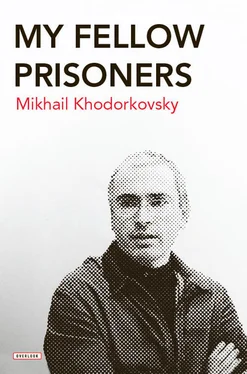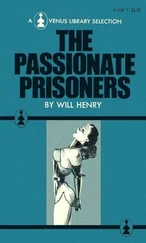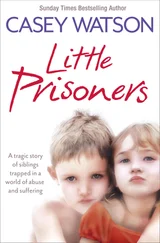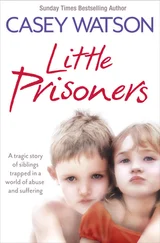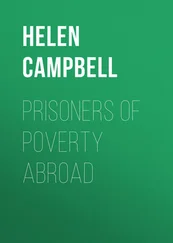A month passes, and then another. No news from Roma. Some of the guys are starting to get seriously worried – they gave him money and are waiting for the packages they ordered.
Soon, however, word comes through. With a new intake of prisoners sent from a local prison. Alas, Roma is already there. He got drunk, got in a fight, nicked a phone. The town is small – he was recognized, of course, and arrested.
Why on earth did he do it? Who knows? Most likely he just didn’t know what to do with himself and subconsciously wanted to return to the familiar world of the labour camp.
Sometimes you get the feeling that the police and the courts are playing a strange kind of game, by releasing on parole just the sort of people who they know they’ll soon be locking up again. And they do absolutely nothing on the other side of the prison fence to make this a less frequent, or even less immediate, occurrence.
The explanation, of course, is simple: human beings are actually less than nothing for the state – they’re just statistical report fodder.
As for the teeth, Roma didn’t have time to get them fixed…
In the camp – as, in fact, on the other side of the barbed wire as well – it’s usually older people who are the readers. The younger ones prefer to watch television – music videos mostly.
That’s what made the young guy, with his head constantly in a book, stand out – that and his good-natured, cheeky grin.
In every other way he was unremarkable. Just another young lag with an alert look and a couple of tattoos (probably a souvenir from the juvenile penal colony; ‘getting inked’ is no longer popular in the adult prisons).
He happened to come up to me one day, asked if I had a book he could read. I learned that Lyosha (as the lad was called) loved fantasy. He’d finished school and was now in prison under Article 158 – for theft. He and some mates had done the rounds of empty dachas, and got caught. And then got caught again. So yes, he had indeed been in the juvenile colony. He’d turned eighteen in there, was transferred here to see out his sentence. Two years in this place already; he was soon due for early release on parole.
One day I noticed that, instead of reading as usual, Lyosha was pacing nervously up and down the barracks, occasionally waving his arms in despair as if engaged in some intractable conversation with someone.
I went up to him.
‘What’s happened?’
‘Problems with the parole.’
‘What kind of problems?’
There are generally two types of issues relating to conditional early release in the camps (if you discount corruption, which is both a problem and a solution). First, early release becomes much more difficult if you’ve tangled with the administration. Secondly, there’s an illegal practice whereby the Federal Penal Enforcement Service assumes the role of the court and sets additional restrictions on early release depending on the crime for which the prisoner has been convicted.
But neither situation applied in this case. Both detainee and case were entirely unexceptional.
‘So what problems are there?’ I asked him.
And at this Lyosha suddenly broke down and the whole story came pouring out.
His father drank. He’d died not long ago. His mother drank. She was ‘deprived of parental rights’. He and his two sisters were taken into temporary care. Then his mother had a cancer operation. She stopped drinking. She took her daughters back but he had to go to an orphanage. For Lyosha it was a stab-wound to the heart.
After the orphanage he ended up in the juvenile colony. His sisters have grown up, they’re now over eighteen. His mother’s still alive. Everything’s okay. Six months ago they promised to come and visit him. He spent a week running round trying to find a room for the visit. By hook or by crook he managed to persuade a fellow inmate to let him have his reserved meeting slot (getting a room in the colony is no easy matter).
Then he waited. And waited. On visiting days, from the moment he wakes a prisoner’s like a cat on hot bricks – the only comparable feeling is the day of release. But they didn’t come to see Lyosha that day. A week later they told him on the phone that for some reason it just hadn’t worked out.
Another stab-wound to the heart.
And now, early release on parole. For that to happen, our bureaucratic police state requires you, the prisoner behind bars, to provide documents (even if they’re completely fictitious) proving that you have somewhere to live and a job on the outside.
Lyosha asked his mother and sisters to help. They said they were too busy.
‘I’ve nowhere to go, and no reason to go anywhere,’ was Lyosha’s summing up of the situation.
I understood what he was going through. The documents weren’t the issue. You can easily get someone to cobble them together – your former cellmates will do it. No, Lyosha had nothing to hold on to in life. No girlfriend, let alone a wife. How could he have? He’d been in prison since he was sixteen or seventeen. He’d lost his father, and now his mother and sisters had rejected him as well.
There was nothing to say, except the usual, ‘Hang on in there, pal.’
And, though I’m ashamed to admit it, I felt a deep sense of joy that I didn’t have to cope with this kind of betrayal. That there were people on the outside who loved me and were waiting for me.
Just think how many abandoned young men are languishing in Russia’s prisons! How many of them there are in here only because they were desperately looking for someone to pay them some attention, craving a place in a world where they seemed like strangers even to those closest to them.
Lyosha wandered around for another day. Then he got into a scrap with another detainee over some minor issue. He had to do a week of ‘additional labour duty’. He then got himself together and wrote a letter to his friends asking them to send the documents he needed.
Everything, it seemed, had resumed its normal course.
Except now Lyosha hardly ever smiles.
You certainly have some surprising encounters in prison. It so happened that most of the prisoners at my work-station were immigrants from Tadzhikistan and Kyrgyzstan. They speak Russian but prefer their own language, of course. So not wanting to be a nuisance (since, when I’m around, they politely try not to switch language), I sit myself next to a tall guy, who’s swarthy and dark-haired like most of them, but who obviously prefers to speak Russian – clearly his first language.
The young man turns out to be half-Lithuanian, from Novosibirsk. And a real-life Nazi – that’s to say he’s a member of one of Russia’s numerous National-Socialist groups. Alexander, as he was called, told me that the camp has ‘only’ twelve Nazi prisoners. They were all convicted for crimes committed as teenagers, which is why they’ve ended up in the general prison regime. He himself made bombs, and that’s what he was sent down for – though there were other things, too, hence his long sentence: seven years. He’s been doing time since he was seventeen; he’s now nineteen.
Alexander is no fool; he got through his secondary school exams (in prison), is interested in philosophy and politics, wants to teach later on. He doesn’t smoke, and says that he doesn’t drink.
The work we do is tedious and doesn’t stop us from talking. What’s more, I’m interested. I’ve never been able to understand how Nazism could be a phenomenon in a country where so many people lost their lives fighting it. I ask a few questions. Alexander is happy to answer them, at least as far as his general understanding and awareness allow him.
He got himself involved with a National-Socialist cell at thirteen: just saw a notice pinned up in a stairwell and gave them a call. He reveres Hitler as the standard bearer for white racial supremacy. He doesn’t consider black or yellow people (redskins somehow don’t come into it) as fully fledged human beings. For some reason he puts immigrants from Central Asia and the Northern Caucasus in the same category.
Читать дальше
